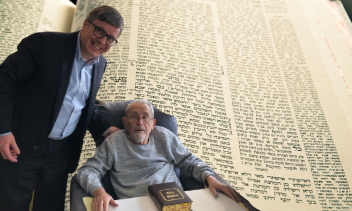You never think it could happen to you. We read headlines of tragedy, visit homes of grief, and see faces of loss. We come like travelers. Sorrow is a pitstop, a place—or a space—we step into for an allotted time. But when we want to return to life, we simply leave. There exists a world for us outside of the pain.
The world does not operate so simply. It only takes a moment for the unthinkable to become tangible, to become real. Those who lost loved ones or experienced great tragedies will often recall how they never expected it to happen. Even when it was not sudden, and the impending loss ruminated for some time, the soul can never quite fathom it. It evades the mind’s grasp. The loss is impossible to understand.
In our conversation with Josh Grajower, he spoke about his late wife, Daniela Sarah z”l, who passed away from pancreatic cancer. We asked him about what came when she left, the process of grief.
David Bashevkin:
Daniela Sarah, somebody who I also knew quite well. I roomed with her older brother in Yeshiva. And I wanted to begin by asking you about the process of grief. There is a theory known as Kubler-Ross, which talks about these five stages of grief. So in the model of Kubler-Ross, which is written by psychologists, they talk about five stages of grief, beginning with denial, and then anger, and then bargaining, and then depression, and then acceptance, where ultimately, the person who is suffering from a loss is able to say, it’s going to be okay. I may not be able to fight for it, but I can prepare and start piecing the pieces of my life back together. So I wanted to begin by asking you to reflect on your own loss, and maybe tell me a little bit about whether or not this process, this tiered levels of loss, resonates with you.
Josh Grajower:
So I think, the categories as categories I guess resonate. I tend not to believe, and I think Kubler-Ross, amongst other authors also talk about that it’s not a linear process per se. It doesn’t follow a flow as simply as from denial to acceptance, but there’s a wave of emotions and there’s a change that certainly happens from different times to different parts. I don’t know if I would have used the word “denial,” but for sure the finality of it in the beginning is really, really, really hard and all almost impossible to understand. And you don’t really think it’s true.
So the word “denial” is assuming that you’re denying that it happened, as opposed to not really believing that it happened. Like thinking you’ll wake up tomorrow and oh, she’s going to be back because it didn’t really happen. So again, for sure, denial – that is denial, thinking that it’s going to happen. … In general, I tell everyone that I speak to, and I’ve spoken to a lot of people who have dealt with their own loss since my own, and I always say feel what you feel. There’s never a right thing to feel at any time.
Sometimes letting yourself feel so vulnerable brings you closer.
That next morning, when the renewal of the day does not bring with it the person, it sets in. We are not used to such finality, which eradicates the hope of seeing that person once again, of holding them in your own arms. The mysterious encounter with death is what Josh follows up with:
I think for me, again, at the beginning, Dannie was sick and it was degenerative, it wasn’t a sudden loss. And I should note this, and I meant to say at the very beginning, everyone’s loss is different, and everyone experiences loss differently. So everything that I’m going to say, obviously, is my own experience. I’m no expert. I haven’t studied loss. But I guess what I mean is that Dannie was sick. It was degenerative. I knew she was going to pass away.
And still, even knowing all that, and even seeing it, when it actually happened, it almost, you didn’t really think that it happened. I guess what I mean, the impossibility, it’s impossible to explain it to anyone who’s never experienced it. I can try my best. But the uproot of your whole life, and everything is going to change from that moment forward, that feeling is beyond overwhelming. And it’s just, I guess, the impossible comprehension of it in that beginning stages, and that for me, the first few months, it was too much to even comprehend it. I couldn’t even process it in a real way. It was like, you don’t feel like it’s real because it’s so impossible to believe that that’s what happened.
Dani Ritholtz, who spoke with 18Forty about his father’s passing, describes that shock in his book, As a Ram Yearns for the Brook: The Journey of a Father and Son. He recounts the morning he learned his father left this world, a moment that leaped out of time:
Me: I look at my phone. It’s 6:06 AM. Someone is calling me. “Mom? Oh, no. It’s… Mom?” Mom: “Dan-Dan, are you up?” Me: “Yeah, I’m up. What’s going on?” Mom: “No, Dani, I need to make sure you are up. Are you up?” Me: I sit up more in my bed and rub my eyes. “Yes, I’m up.” Mom: “Dani, my sweet, sweet boy, I have terrible news.” Me: “What happened?” Mom: “Well, daddy, we found him and we needed to take him to the hospital the first day of Rosh Hashanah. It was an infection and he was unconscious the whole time.” Me: “Did he pass away?” Mom: “I’m so sorry, my sweet boy, yes.” Me: I shoot up from my bed and start appeasing. “It’s okay. It’s okay. It’s okay. It’s okay. It’s okay.” Mom: “I know this is so hard to hear on the phone. I’ll stay on as long as you need, but you need to know how much he loved you.” Me: “I know. When did it happen?” Mom: “Just a few hours ago, Rabbi Adler was here. He didn’t seem to be in so much pain.” Me: “Okay. Okay. Okay. Where is the funeral going to be? Baruch dayan ha’emet.” Tears start to flow.
The stream of consciousness offers entrance into the intimacy of loss. That point of vulnerability, when the unimaginable becomes not just imaginable, but tangible, is a whirlpool of tears, silence, stillness, and shock. Part of those feelings stems from the lack of control born out of death, which is something Rachelle Fraenkel spoke about.
Rachelle Fraenkel:
Most of the time, we’re covered, we’re pampered. There’s a poem in [inaudible], he says, he talks about the death and he says, “My paddings are falling apart, and suddenly my mortality is showing, it’s peeking.” And something about such experiences, it doesn’t necessarily push you away. Sometimes letting yourself feel so vulnerable brings you closer. It doesn’t necessarily have to be that. If I take the perspective of walking someone else through hardship, you’re the mentor, you’re the friend, you’re the parent, you’re whatever. And you want to have all the answers, but you don’t have the answers. So it’s more about being with them, and experiencing all kinds of things.
To deepen our comprehension of loss, we turned to ask Josh about not just his own processing, but the processing of his community members. While he was a resident of loss, they were mere visitors.
David Bashevkin:
I think for a lot of people, and tell me if this is true and how you react to this, I mean, I think human beings have a hard time understanding what loss is. It’s the ultimate mystery. Once you’re alive, there’s the mystery of what happened before, and then there’s the mystery of what happens after. And people, in order to make sense with it, and it’s something that you were intimately close with, so a lot of times people, in order to make sense of, people who knew Dannie, or are trying to process the loss, try to become closer in proximity to the person who lost the person. I don’t think it’s quite voyeuristic, but they want to visit, they want to connect to help them process with the loss. Was that something that you noticed, and did it bother you that people, in order to process their own loss want to be close with you to make it more tangible and real?
Josh Grajower:
I definitely felt other people’s inability and process of the loss. I definitely felt that. For some people, I think, it was just hard for them in their own way, and I think if this is what you meant by what you said, I definitely felt, and reasonably so, that a lot of people feared it for their own lives. I definitely got a feeling from people that there was a feeling of grief for me and for them and their relationship with Dannie, and also an implicit, unspoken, and maybe what I just sense of fear, of, “Oh my gosh, this could happen to me. By all standards, Dannie was a normal, regular, grew up in the same world as all these people, and all of a sudden she was sick, and all of a sudden she passed away. So I definitely felt that. But in general I had very positive interactions with people, and I felt that people really cared, and I felt that people were very supportive of me. And again, the people that stayed close with me and remained close with me were definitely very strong support team for me at that time.
The strangeness of death, of loss, is that no matter how many books we read, how many philosophical discussions we have, how many psychologists we speak with, how many times we experience it, it will always be elusive—impossible to understand.






